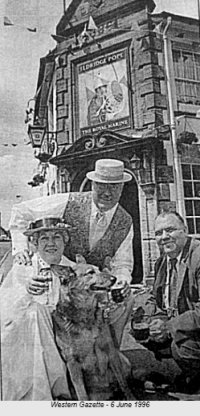the history of yeovil's pubs
PUBS HOME PAGE |
PUBS INTRODUCTION |
PUBS BY NAME |
BEERHOUSES |
royal marine inn
36 Great Western Terrace (Goar Knap)
The Royal Marine Inn was built to serve the area known as Goar Knap, which is that area containing Great Western Terrace and New Prospect Place (see map below). The name comes from the Anglo-Saxon gora, a gore, or triangular-shaped piece of land, and hnaep, for rising ground or the crest of a hill.
New Prospect
Place, in 1858
known as
'Jenning's
Buildings' was a
long terrace of
small cottages,
now demolished
and the land
used as
allotments. They
were described
as "simply huts
with no
foundations and
originally
having earth
floors". Even so
they were not
demolished until
1907.
There are a
couple of the
cottages left at
the western end
of Great Western
Terrace, the
remainder being
demolished in
the mid-1970's
for the
sheltered
housing scheme -
at the time I
worked for the
Borough
Architect and
finalised the
design of the
scheme and
supervised its
building. As a
side note, most
of the cottages
that were
demolished had
cellars, one of
which lay below
the foundations
of the new
buildings and
opened up during
construction. I
instructed the
contractor to
fill the void
with concrete
but after some
several
lorry-loads of
concrete had
disappeared into
the void it was
discovered that
an underground
stream ran along
under the old
cellars, the
floor of the
cellar had
collapsed into
the stream and
the newly-pumped
concrete had
simply been
washed away -
surprising that
the cottages
survived until
the 1970's!
The present Royal Marine is a two-storey corner site building, (probably) built of brick under painted render with Ham stone to the corner elevation all under a Welsh slate roof. Fenestration is in nicely-proportioned sash windows with some modern replacements to the first floor. On the quoined corner of the building the main double entrance doors are set within a shallow arched surround and are flanked with carved jambs with a corbelled hood over, supporting a swan-neck pediment - with a similar pediment to the side entrance. The whole of the corner elevation is surmounted by a peak pediment raised above eaves level on a short parapet inscribed with the date 1896. The pediment itself bears a small central shield inscribed, in a flourished script, what appears to be the initials EP, presumably the initials of the builder undertaking the work.
The following is from an un-named newspaper cutting displayed on the Royal Marine's Information Sheet -
|
"Mary Jane King was eight years old when she died of fever at her home in Goar Knap, which in 1872 was one of the poorest parts of Yeovil. Her father John was a farm labourer with very little material wealth and no savings to pay for her funeral. Determined to take his daughter to the cemetery, he borrowed a handcart and placed the small coffin on it. He then set off along the muddy road through the nearby brickyard on his was to Preston Road. When some of the mothers living in Goar Knap (or, as it was described in the report, 'the colony') heard of John King's mission, they set off after him determined to prevent the child being taken to the grave 'in such an indecent manner'. He had not gone far before the women caught up with him and forced him to return home. They took the coffin off the hand cart and clubbed together with their neighbours to pay for Mary Jane King to have a 'proper' funeral. Goar Knap was an area of poverty, and the living conditions were finally cleared when the old Yeovil Borough Council purchased the houses early in this century. The site, off St Michaels Avenue, was never redeveloped but turned into public allotments." |
The Royal Marine
Inn was built as
a corner site
beerhouse at the
junction of
New Prospect
Place with
Great Western
Terrace about
1860 by Stephen
Harris, a Master
Builder of
Kingston,
employing 3 men
and 2 boys. In
1870 the
original owner,
John Dimond,
leased the
premises to
Lizard & Mason,
who were trading
as Eldridge
Mason & Co of
Dorchester. It
was then known
as the Royal
Marine Inn.
On 29 October 1886 the Western Gazette reported "On Saturday morning, a fire, which, when discovered, threatened the destruction of the premises, took place at the Royal marine, Great Western Terrace. Some clothes in front of the fire in the parlour by some means ignited and had a firm hold of the contents of the room before, through the energetic exertions of the landlord's neighbours, it was subdued. Damage to the amount of about £7 was done."
A further plot of land was purchased in 1896 and the present building was erected - the date 1896 above the corner entrance indicates the rebuild. The 1901 Ordnance Survey map shown above indicates the rebuilt building.
The house
obtained a full
public house
license in 1935
and a skittle
alley was added
in 1957.
![]()
The first licensee was George Connock (listed in the 1871 census as George Cormack), born around 1823 at Montacute. He was married to Sarah, seven years his elder, who was born in Preston Plucknett. Most of their children had been born in Hampshire, where George had been a dairyman. In 1875 the property was conveyed to Alfred & Edwin Pope. George died in 1879 and Sarah assumed the license. She appears in the 1881 census as an innkeeper with spinster Mary Trask as a general servant. Sarah died in 1889 and the license was taken on by George Forsey.
|
George Forsey was born about 1853 in Stoke Abbott, Dorset, the son of Job Forsey, an agricultural labourer, and his wife, Eliza. In 1871 George, still living with his parents in Corscombe, Dorset, was also an agricultural labourer but by 1881 he was living with his future wife's relatives in Beaminster, Dorset, and was working as a labourer on the railway. He next appears in the 1891 census as a 'Landlord of a Public House' (the Royal Marine) with his wife, Mary née Bowditch, described as a landlady, and their two children. George died in 1894. Mary continued as licensee for a couple of years after the death of George and in 1900 she married George Talbot and he is listed as licensee from then. George was born around 1845 at North Cadbury, the son of George Talbott, a miller and baker, and his wife Anne. By 1861, at the age of 16, George was still living with his parents and described his occupation as a blacksmith. By 1881 George, still a blacksmith, was living at 66 South Street, Yeovil, with his wife, Mary, a dress and mantle maker. Mary died around 1895 and George married Mary Forsey in 1900. Mary, first as Mrs Forsey and later as Mrs Talbot, completed 50 years as landlady of the Royal Marine. |
map
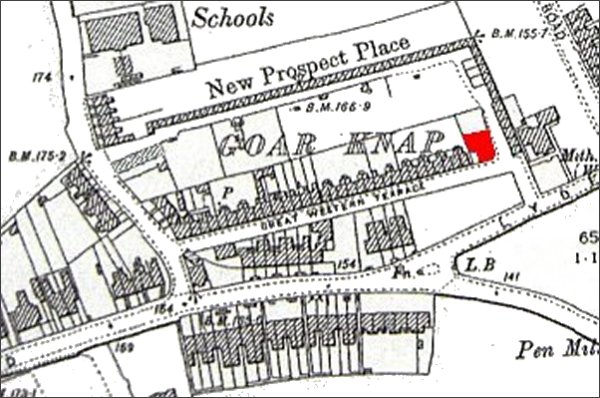
The 1901 Ordnance Survey highlighting the location of the Royal Marine.
gallery
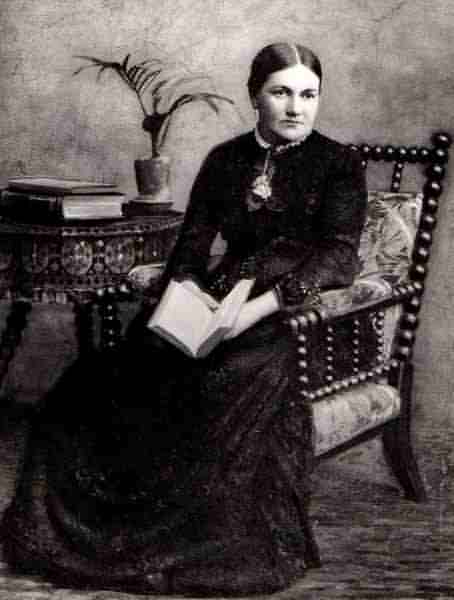
Courtesy of
Elaine Old
Mary Miriam Bowditch - landlady of the Royal Marine for more than 50 years.
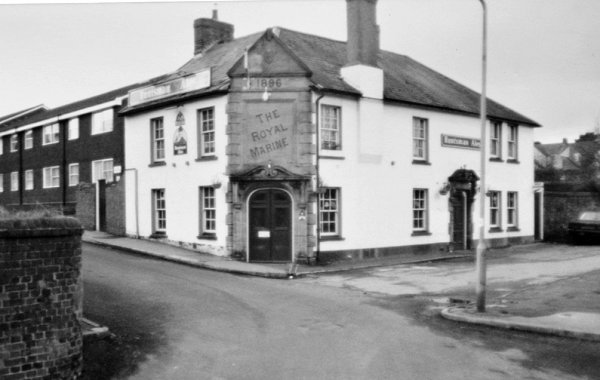
Courtesy of
Chris Rendell
The Royal Marine photographed in 1985. (The sheltered housing scheme at far left was designed by me in the mid-1970s).
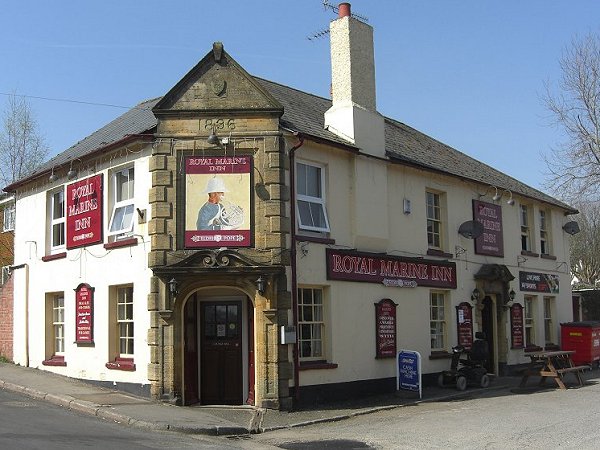
The Royal Marine photographed in 2012.
licensees
1870 – George
Connock (Royal
Marine
Information
Sheet)
1871 – George
Connock –
Beerhouse Keeper
(1871 census -
listed as George
Cormack)
1881 – Sarah
Connock (65 year
old widow) – Inn
Keeper (1881
census) listed
as Royal Marine
1889 – George
Forsey – Beer
Retailer
(Kelly’s 1889
Directory)
listed as Royal
Marine
1891 – George
Forsey –
Landlord of
Public House
(1891 census)
1895 – George
Forsey – Beer
Retailer
(Kelly’s 1895
Directory) pub
not named
The Royal Marine
was rebuilt in
1896 (date
carved over
entrance).
1897 – Mrs Mary
Forsey – Beer
Retailer
(Kelly’s 1897
Directory)
listed as Royal
Marine. Mary
Forsey
married George
Talbot. Mary,
first as Mrs
Forsey and later
as Mrs Talbot,
completed 50
years as
landlady.
1901 – George
Talbot –
Innkeeper (1901
census) pub not
named
1911 – George
Talbott –
Innkeeper (1911
census) listed
as Royal Marine
1914 – George
Talbott – Beer
Retailer
(Kelly’s 1914
Directory) pub
not named
1919 – G Talbott
– Beer (Kelly’s
1919 Directory)
pub not named
1931 – Ernest
Symons (RM Info
Sheet)
1935 – Ernest
Frederick Symons
(Kelly’s 1935
Directory) pub
not named
1936 – EF Symons
(1936 Yeovil
Directory)
listed as Royal
Marine
1938 – EF Symons
(1938 Yeovil
Directory)
listed as Royal
Marine
1939 – Ernest
Symons (Kelly’s
1939 Directory)
listed as Royal
Marine PH
1947 – Licensee
not named (1947
Yeovil
Directory)
listed as Royal
Marine
1951 – Licensee
not named (1951
Yeovil
Directory)
listed as Royal
Marine Inn
1951 – Charles
Cook (Royal
Marine
Information
Sheet)
1954 – C Cook
(1954 Yeovil
Directory)
listed as Royal
Marine Inn
1957 – C Cook
(1957 Yeovil
Directory)
listed as Royal
Marine
1960 – C Cook
(1960 Yeovil
Directory)
listed as Royal
Marine
1964 – Charles
Cook (Foord's
1964 Directory)
1965 – Licensee
not named (1965
Yeovil
Directory)
listed as Royal
Marine
1968 – Licensee
not named
(Kelly’s 1968
Directory)
listed as Royal
Marine Inn
1969 – Mr & Mrs
Russell (Royal
Marine
Information
Sheet)
1969 – Licensee
not named
(Kelly’s 1969
Directory)
listed as Royal
Marine Inn
1970 – Licensee
not named
(Kelly’s 1970
Directory)
listed as Royal
Marine Inn
1971 – JJ
Stanton (RM Info
Sheet)
1971 – Licensee
not named
(Kelly’s 1971
Directory)
listed as Royal
Marine Inn
1972 – Licensee
not named
(Kelly’s 1972
Directory)
listed as Royal
Marine Inn
1973 – Licensee
not named
(Kelly’s 1973
Directory)
listed as Royal
Marine Inn
1974 – Matthew
Harris (Kelly’s
1974 Directory)
1976 – MC Ford
(Royal Marine
Information
Sheet)
1978 – SV Dack
(Royal Marine
Information
Sheet)
1980 – JD
Blackmore (Royal
Marine
Information
Sheet)
1984 – AE Bailey
(Royal Marine
Information
Sheet)
1976 – MC Ford
(Royal Marine
Information
Sheet)
1987 – Licensee
not named
(Denton’s 1987
Directory)
listed as Royal
Marine Inn
1990 – Clive &
Joy Dennett
(Royal Marine
Information
Sheet)
1996 – Clive &
Joy Dennett
(Western Gazette
article above)
1996 – Brian &
Patricia Bush
(Royal Marine
Information
Sheet)
1998 – Keith
Lines (Royal
Marine
Information
Sheet)
2006 – Wayne &
Donna Singleton
Ford (Royal
Marine
Information
Sheet)
2010 – Donna
Singleton (Royal
Marine
Information
Sheet)
